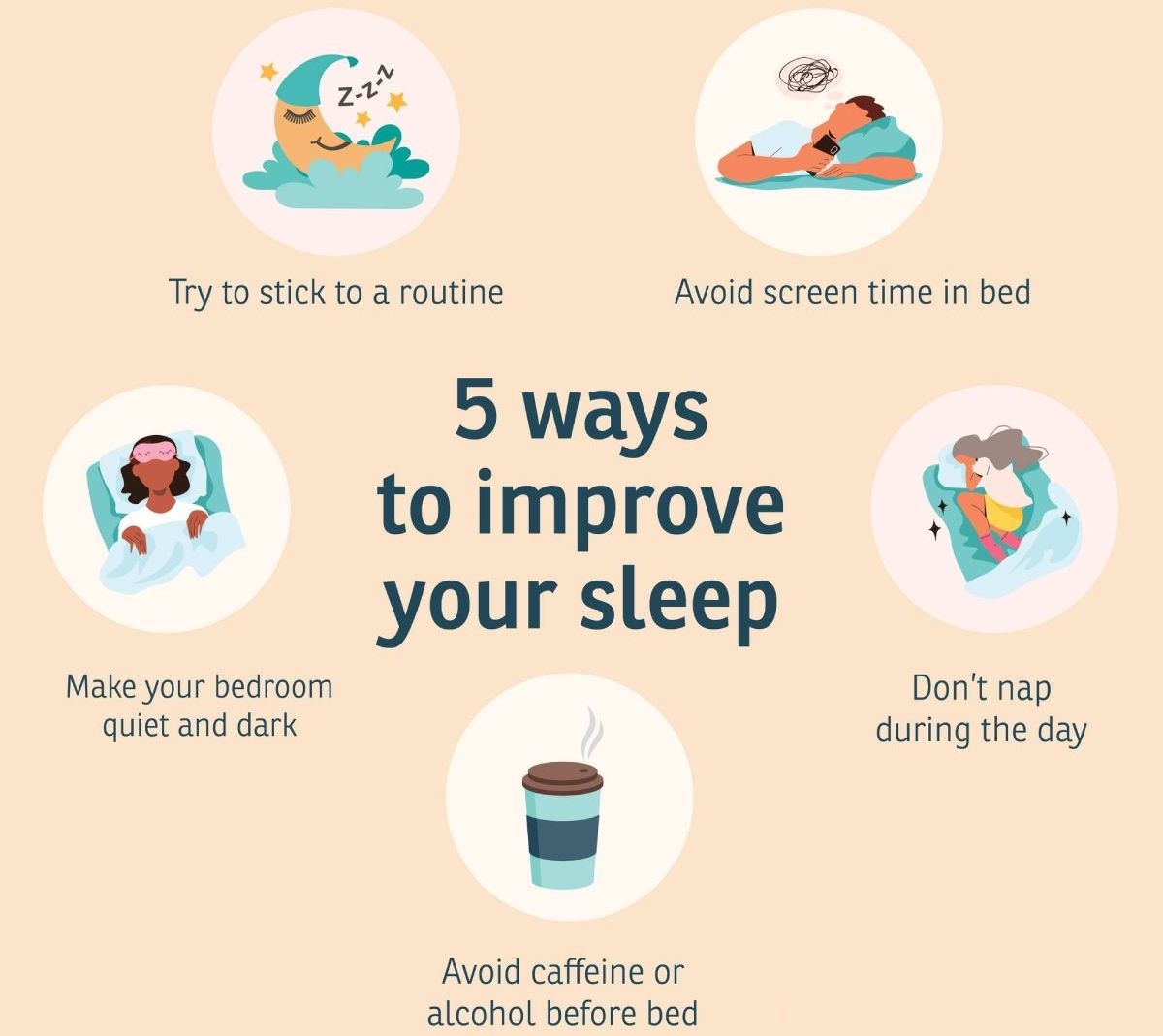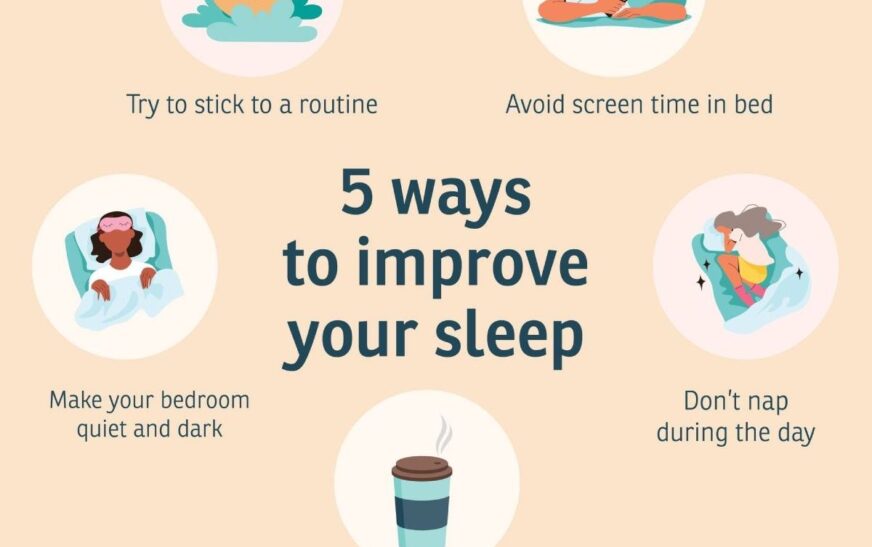Improve Sleep for Better Health explores the vital connection between quality sleep and overall well-being, offering insights on how to optimize your sleep for improved health.
Discover the impact of sleep on physical and mental health, along with practical tips to enhance your sleep quality and overall wellness.
Importance of Sleep for Health
Quality sleep plays a crucial role in maintaining overall health and well-being. It is during sleep that our bodies repair and rejuvenate, helping to support various bodily functions and processes. The relationship between good sleep and health is deeply interconnected, with numerous studies highlighting the importance of adequate rest for optimal physical and mental health.
Impact of Lack of Sleep on Physical and Mental Well-being
Lack of sleep can have significant negative effects on both our physical and mental health. Physically, inadequate sleep has been linked to a higher risk of chronic conditions such as obesity, diabetes, and cardiovascular diseases. It can also weaken the immune system, making individuals more susceptible to illnesses.
On the mental health front, sleep deprivation can lead to mood swings, irritability, and difficulty concentrating. Chronic sleep problems have also been associated with an increased risk of anxiety, depression, and other mental health disorders. Cognitive function, memory consolidation, and decision-making abilities can all be compromised when sleep is inadequate.
Scientific Research Findings on Benefits of Good Sleep for Health, Improve Sleep for Better Health
Research has shown that getting enough quality sleep is crucial for maintaining optimal health. Adequate sleep is essential for cognitive function, memory consolidation, and overall mental well-being. Studies have also linked good sleep to better emotional regulation and stress management.
Additionally, quality sleep plays a vital role in supporting physical health. It is during restful sleep that the body repairs tissues, synthesizes proteins, and releases growth hormones essential for growth and development. Good sleep has been associated with a reduced risk of chronic diseases, improved immune function, and better cardiovascular health.
In conclusion, prioritizing sleep is essential for overall health and well-being. By recognizing the importance of quality rest and implementing healthy sleep habits, individuals can significantly improve their physical and mental health outcomes.
Tips for Improving Sleep

Creating a conducive sleep environment and following a consistent sleep schedule are crucial for promoting better sleep. Additionally, incorporating relaxation techniques and bedtime routines can further enhance the quality of your sleep.
Conducive Sleep Environment
- Avoid exposure to screens before bedtime, as the blue light emitted can disrupt your body’s natural sleep-wake cycle.
- Ensure your bedroom is dark, quiet, and at a comfortable temperature to promote deep and restful sleep.
- Invest in a comfortable mattress and pillows that support your body and help prevent any aches or discomfort during the night.
Consistent Sleep Schedule
- Go to bed and wake up at the same time every day, even on weekends, to regulate your body’s internal clock.
- Avoid napping excessively during the day, as it can interfere with your ability to fall asleep at night.
- Establish a relaxing bedtime routine, such as reading a book or taking a warm bath, to signal to your body that it’s time to wind down and prepare for sleep.
Relaxation Techniques and Bedtime Routines
- Practice deep breathing exercises or meditation to calm your mind and body before bedtime.
- Avoid consuming caffeine or heavy meals close to bedtime, as they can disrupt your sleep.
- Engage in light stretching or yoga to release tension and promote relaxation before going to bed.
Impact of Nutrition on Sleep
Nutrition plays a crucial role in influencing our sleep quality. The foods we consume can either promote better sleep or hinder our ability to rest effectively. Understanding the connection between diet and sleep is essential for improving overall sleep health.
Foods that Promote Better Sleep
Eating certain foods can help promote better sleep by providing essential nutrients that support relaxation and sleep-inducing hormones. Some foods known to aid in improving sleep include:
- Fatty fish such as salmon, tuna, and mackerel, which are rich in omega-3 fatty acids and vitamin D.
- Nuts and seeds like almonds, walnuts, and flaxseeds, which are high in magnesium and tryptophan.
- Whole grains like oats and brown rice, which contain complex carbohydrates that can help regulate serotonin levels.
- Fruits such as bananas and kiwis, which are good sources of melatonin and antioxidants.
Avoiding Certain Foods Before Bedtime
Consuming certain foods and drinks close to bedtime can disrupt sleep patterns and make it harder to fall asleep. It’s important to avoid the following:
- Caffeine: Found in coffee, tea, and chocolate, caffeine is a stimulant that can interfere with sleep.
- Alcohol: While alcohol may initially make you feel sleepy, it can disrupt the quality of your sleep later in the night.
- Spicy and heavy foods: These can cause indigestion and discomfort, making it difficult to relax and fall asleep.
- Sugary foods and refined carbs: These can cause fluctuations in blood sugar levels, leading to wakefulness during the night.
Exercise and Sleep Quality: Improve Sleep For Better Health
Physical activity plays a crucial role in promoting better sleep quality. Regular exercise can help regulate your sleep patterns and improve the overall quality of your rest. Let’s delve deeper into how exercise impacts your sleep quality and the ideal ways to incorporate physical activity into your routine for better sleep.
Impact of Exercise on Sleep Patterns
Regular physical activity has been shown to improve sleep duration and sleep quality. Exercise helps reduce the time it takes to fall asleep and can also increase the amount of deep sleep you experience. This deep sleep phase is crucial for physical and mental restoration, allowing you to wake up feeling refreshed and rejuvenated. Additionally, exercise can help alleviate symptoms of insomnia and sleep disorders, promoting a more restful night’s sleep.
Ideal Timing and Type of Exercise for Better Sleep
The timing of your exercise routine can significantly impact your sleep quality. Aim to finish your workout at least a few hours before bedtime to allow your body temperature to cool down and your mind to relax. Engaging in vigorous exercise close to bedtime may have a stimulating effect, making it harder to fall asleep. Choose low-impact activities such as yoga or stretching in the evening to promote relaxation and prepare your body for sleep. Experiment with different types of exercises to find what works best for you and your sleep routine.
Relationship Between Regular Exercise and Improved Sleep Quality
Consistent exercise has been linked to improved sleep quality over time. Incorporating physical activity into your daily routine can help regulate your circadian rhythm, making it easier to fall asleep and wake up at the same time each day. Exercise also reduces feelings of stress and anxiety, which are common contributors to sleep disturbances. By prioritizing regular exercise, you can create a positive cycle of better sleep and overall health.
Closure
In conclusion, prioritizing quality sleep not only benefits your health but also contributes to a more fulfilling life. Implementing the tips and strategies discussed can lead to significant improvements in your overall well-being.
FAQ Resource
How does lack of sleep affect overall health?
Lack of sleep can lead to a weakened immune system, increased risk of chronic conditions, and cognitive impairment.
What are some relaxation techniques to improve sleep?
Deep breathing exercises, meditation, and gentle stretching before bedtime can help promote better sleep.
Can diet influence sleep quality?
Yes, certain foods like bananas, almonds, and herbal teas can enhance sleep quality, while heavy or spicy meals may disrupt sleep.







